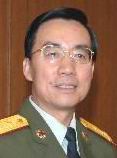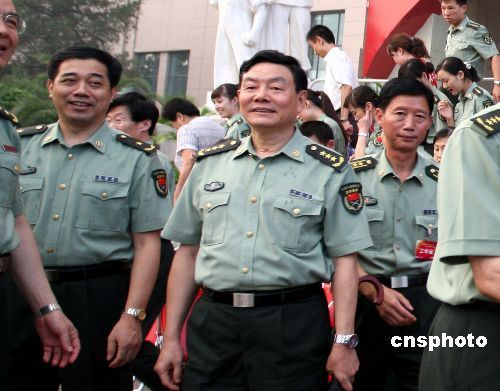By Li Mingjiang, Straits Times, August 22, 2007
The Chinese People's Liberation Army (PLA) has launched a series of personnel changes since June this year, the most notable case being the swop of posts between Lieutenant-General Zhang Qinsheng, deputy chief of General Staff of the PLA headquarters, and General Liu Zhenwu, commander of the Guangzhou Military Region and former commander of the PLA Hong Kong Garrison.
These unconventional personnel moves serve to promote better communications between headquarters and the regional commands. They will also allow President Hu to offer his protege opportunities to gain more experience in anticipation of further promotions a few years later. For example, former deputy chief of General Staff Zhang Qinsheng was previously the PLA's senior intelligence and anti-espionage expert. The English-speaking 59-year-old Zhang, however, lacks command-and-control experience. A stint as Guangzhou Military Region Commander will better qualify Zhang, who is deemed close to Hu, for a top post in headquarter departments.

Zhang Qinsheng
Some commentators believe that this new round of reshuffles of senior officers demonstrates the Beijing regime is increasingly implementing its strategy of cultivating 'multi-talented' military commanders to cope with the requirements of China's new military revolution and army building.
One approach of fostering comprehensive skills for senior military leaders is to place them at positions or places where they have had no prior experience, a departure from the traditional way of usually letting them rise up in the same unit or sector. The Zhang-Liu swop represents such trend.
In the Chinese military hierarchy, a deputy position of the four general departments of the PLA headquarters, which include the departments of General Staff, General Armament, General Political Affairs and General Logistics, is equivalent to a full position at a Military Region or other military units that enjoy a Military Region status - the air force, the navy, the second artillery force, the National Defence University and the Academy of Military Sciences. In this sense, Lt-Gen Zhang's 'external transfer' is a lateral move in position, with no change in ranking.
However, a deputy position at the Department of General Staff is usually preferred over a full position at a Military Region because it is often an inevitable step for possible promotion to the position of chief of general staff and ultimately to the membership of the Central Military Commission. With few exceptions, full-position leaders at a Military Region level usually have to go through the deputy positions of the general departments to move upward to the Central Military Commission. It looks like Lt-Gen Zhang's transfer was a nominal demotion, but his case needs to be understood in the relevant context.
Normally, as is also true in the Chinese civilian sectors, an 'external transfer' would take place for two purposes. First, the person to be transferred is about to retire or has no prospect of being promoted, or in some cases as an implicit penalty. The transfer is meant to open up the position for a newcomer who may be seen as more promising in the eyes of the superior. Another possible reason for transferring the person to a position out of the headquarters is for the person to gain more practical experience for possible promotion or for him to assume additional responsibilities in the future.
Lt-Gen Zhang's change of job most likely represents the second pattern. He has served a long time at PLA headquarters. His jobs included serving as director of the Campaign Teaching and Research Office under the National Defence University (NDU), dean of studies at the NDU and director of the Operations Department of the General Staff Department. He is known as an expert in integrated warfare and training, particularly in information technologies (IT). He was promoted twice in two years, first as assistant chief of staff in 2004 and then deputy chief of staff in 2006. His expertise in military operations and IT helped him with his rise.
In addition to his extensive expertise, Lt-Gen Zhang performed fairly well first as assistant chief of staff and then as deputy chief of staff. He took over the responsibilities of the retired General Xiong Guangkai, taking charge of the PLA's external affairs, including joint military exercises with foreign troops and China's military diplomacy. His job performance in these areas has been positively acknowledged by observers.
Lt-Gen Zhang is 59 years old, which, according to PLA regulations, allows him to stay at the full position of Military Region level for at least six more years. Age requirement for membership in the Central Military Commission is a bit more flexible. In light of these factors, Lt-Gen Zhang's temporary transfer to the Guangzhou Military Region likely will be a stepping stone for further promotion.
Training Talent
The case of Lt-Gen Zhang's transfer represents the importance that the PLA attaches to training senior leaders with multi-faceted skills. Lt-Gen Zhang already has extensive experience working at the PLA headquarters, but he lacks the actual experience of commanding the troops. His transfer is perhaps meant to provide an opportunity for him to obtain more practical experience and knowledge of field commanding. This is increasingly an approach of the Chinese military - to cultivate senior military officers with multiple talents or comprehensive skills.
The emphasis on comprehensive skills is regarded as an indispensable part of the PLA's new 'leap-frog' military revolution programme. Starting from the 1990s, Chinese senior military leaders called for the PLA to give priority to preparing for future local wars that would centre on information technologies. A key component of future information-oriented war fighting is integration, which requires commanders to be knowledgeable in multiple areas and to sharpen their speed of response and standard of coordination.
As a matter of fact, this new round of military personnel changes for the purpose of building comprehensive skills is not something new. In the past few years, the PLA adopted unprecedented organisational measures at the very top level to ensure that multiple skills are available in military operations. For instance, the inclusion of the commanders of the air force and navy into the Central Military Commission and the promotion of generals in the air force and the second artillery force into the leadership of the General Staff were meant to give the top decision-making bodies immediate access to all sorts of skills and not just keep the traditional lop-sided dominance of the army.
Trapping Tiger
On the other hand, some commentators surprisingly point out that the Zheng-Liu swop is solely directed to Liu Zhenwu, but has nothing to do with Zheng Qinsheng. Allegedly, Liu Zhenwu is currently under investigation by the PLA Commission for Disciplinary Inspection for corruption accusations against Liu, which is the only cause of the Zheng-Liu swop as some commentators believe. Yes, it really makes sense by removing a corruption suspect Liu Zhenwu from his southern stronghold and bringing Liu to the vicinity of the northern investigator. And investigation can be carried out even more perfectly by dispatching a disciple loyal to Hu, like Zheng Qinsheng, to take over Liu's corrupt southern hide-out.

Liu's (center) last public appearance in mid-August
President Hu has proven to be more willing than Jiang to punish errant, corrupt officers. Earlier this month, the PLA Commission for Disciplinary Inspection, the army's top anti-graft watchdog, announced that personnel with economic crimes would have 30 days in which to give an account of their misdeeds and surrender ill-gotten gains in return for more lenient treatment. The circular noted that anti-corruption and auditing experts were particularly targeting PLA officers responsible for handling the purchase of equipment and provisions or engaged in engineering and services-related jobs (Jiefangjun Bao, July 7; Wen Wei Po, July 10). Given the lucrative real-estate market in China, a number of senior officers are also being investigated for granting military-owned land to commercial property developers. In the late 1990s, the CMC had forbidden all PLA units to engage in business, with the exception of the buying and selling of military equipment. Different military regions and districts, however, are in possession of valuable assets, especially land. Furthermore, given the disparity in the salaries and fringe benefits between PLA officers and civil servants, the temptation for military personnel to engage in side-line activities has risen.
Li Mingjiang is an Assistant Professor at the S. Rajaratnam School of International Studies, Nanyang Technological University.